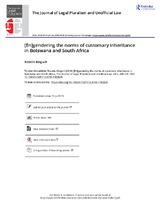[En]gendering the norms of customary inheritance in Botswana and South Africa
Abstract
The article responds to the article by Weinberg in this issue. She
traces the trajectory of court hearings concerning the contested
inheritance of land in Botswana, which, after several prior
judgements eventually resulted in a positive outcome for the
woman litigants. I acknowledge the author’s key argument, which
concerns the impact of power relations on the construction of
customary law and the reproduction of knowledge in the courts.
Certain versions of “custom” were promoted and others stilled to
the disadvantage of women. I argue that the normative patterns of
landholding are indeed gendered, but do not result in a binary
structure of men and women. “Gender” should be disaggregated to
take into account a range of status criteria within and across the
categories of male and female in order to understand the
differential impact of social relations on the outcomes of property
struggles. The normative lines of property transmission frequently
follow a logic of “family property” that allows for qualifying women
to rights of property. Family property has vastly different social and
legal consequences to private, individualised property rights. The
corollary is that it is misleading to speak of the processes of
succession to rights of access to, and control of customary property
in terms of one-to-one “inheritance” of land. The concept of “living
law” inadequately reflects these social dynamics.

